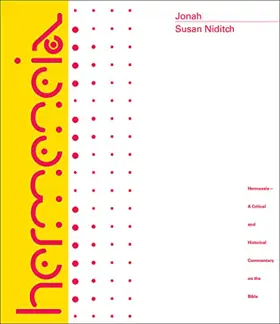

Jonah
in Hermeneia
Pages
300
Publisher
Fortress Press
Published
2022
ISBN-13
9780800699031
In the new Hermeneia volume, the Jonah translation and commentary, renowned biblical scholar Susan Niditch encourages the reader to investigate challenging questions about ancient conceptions of personal religious identity.
Jonah's story is treated as a complex reflection upon the heavy matters of life and death, good and evil, and human and divine relations. The narrative probes an individual's relationship with a demanding deity, considers vexing cultural issues of us versus them, and examines the role of Israel's god in a universal and international context. The author examines the ways in which Jonah prods readers to contemplate these fundamental issues concerning group- and self-definition.
In her technical study of Jonah's language, style, structure, content, and context, Niditch examines the text through the comparative lens of international folklore. The thread of appropriations of Jonah by post-biblical writers and artists is explored, and special attention is paid to rabbinic midrash, medieval Jewish manuscript illuminations, and Christian art of late antiquity. And in the tradition of Hermeneia volumes, the commentary evaluates and incorporates the insights of a long legacy of scholars who have explored this venerable text from varied perspectives.
Jonah's story is treated as a complex reflection upon the heavy matters of life and death, good and evil, and human and divine relations. The narrative probes an individual's relationship with a demanding deity, considers vexing cultural issues of us versus them, and examines the role of Israel's god in a universal and international context. The author examines the ways in which Jonah prods readers to contemplate these fundamental issues concerning group- and self-definition.
In her technical study of Jonah's language, style, structure, content, and context, Niditch examines the text through the comparative lens of international folklore. The thread of appropriations of Jonah by post-biblical writers and artists is explored, and special attention is paid to rabbinic midrash, medieval Jewish manuscript illuminations, and Christian art of late antiquity. And in the tradition of Hermeneia volumes, the commentary evaluates and incorporates the insights of a long legacy of scholars who have explored this venerable text from varied perspectives.
Reviews
Susan Nidich focuses her research on oral literature and folklore as they apply to the OT. Such studies inform her latest commentary. [This] is not the typical historical critical study one might expect from the Hermeneia series. Though the author interacts with critical scholars and provides her own translation with text-critical analysis, the work focuses on questions like religious identity and how the story of Jonah is used in international folklore...
[T]he book is organized in the standard Hermeneia format, with a fresh translation, textual notes, and verse-by-verse commentary. Niditch's translations are quixotic and very wooden, sounding "Yoda-like." Consider for example Jonah 1:9: "A Hebrew am I, and Yahweh ... I fear" (p. 38). She states that She wants to reflect the Hebrew style, but the approach goes overboard. In her textual commentary, Niditch gives a good sense of the story as it happens, noting the repetition of vocabulary and explaining themes (such as going downward into the ship/ocean). Unlike other commentaries, though, Niditch concludes each pericope with an overview discussion that addresses comparative folklore and textual whichin... As to the usefulness of the commentary, that depends upon what the reader is looking for. For detailed comments on the text one should look elsewhere. For information on how themes are appropriated in (or at least similar to) later cultures, this commentary excels. The commentary is full of interesting bits of information, such as Pirge R. Eliezer's writing on Jonah being carried to the temple locus while in the belly of the creature. However, Niditch does not then return to how these later appropriations might help one understand the meaning of the text. For a unique look at Jonah and its afterlife, this commentary provides help. For understanding this portion of Scripture, better options exist.
